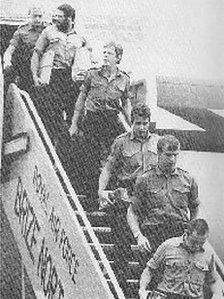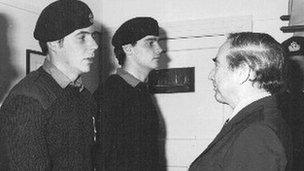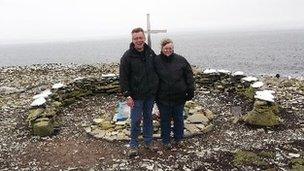Falklands War: Living with post-traumatic stress disorder
- Published

Brian Jones returned from war in 1982, but was plagued by guilt
Thirty years ago, during the Falklands War, British ship HMS Sheffield was hit by an Argentinian missile.
Twenty crew were killed and the burning vessel was abandoned.
In all, 255 Britons died in the Falklands conflict, with many more physically injured. Countless others are still living with mental wounds.
"I'll never forget the day we were hit", remembers Brian Jones, who was just 21 when HMS Sheffield was struck by an Exocet missile.
"The only warning we got was from the upper deck, the officer on the watch saying - 'brace for impact' - missile impact."
Every second of that traumatic day (4 May) and the subsequent weeks is still seared into Brian's mind.
He did not realise how many had died at the time, but remembers the casualties: "We were like a family on HMS Sheffield, and we still are."
Twenty of Brian's comrades perished that day, and survivors spent hours fighting fires before their ship - nicknamed the "Shiny Sheff" - was abandoned and eventually sank.
Brian is still thankful to the sailor who stopped him falling into the freezing sea as he leapt to another vessel alongside his burning ship.
But when he finally returned from the Falklands, the enthusiastic welcome for British forces only left him feeling more guilty that he had survived, while others had not.
"It was like a hero's return, but I didn't feel like that at the time", he says.
'Struggling to get away'
Brian tried to repair his life, but was badly affected and continued having "episodes", even after leaving the Royal Navy in 1985.
Being sent back to serve on the Falkland Islands in 1983, surrounded by the debris of war, did not help.
For years afterwards, Brian drank too much and withdrew from friends and family, feeling "angry, frustrated, even violent at times".
"I started having nightmares, and I woke up one morning and saw marks on my girlfriend's neck", he says.
"I'd been having nightmares and I'd gripped her neck as if I was struggling to get away from something."
It was only in 2009 that the veteran finally sought treatment and was diagnosed with post-traumatic stress disorder or PTSD at the ex-services mental welfare charity, Combat Stress.
There, therapists helped him to cope with his guilt and the mental images that still paralysed him.
His partner for the last six years, Melanie Williams, says that while it has been "hard", things could have been worse. The treatment has transformed their lives.
"Brian hasn't hit the bottle and he hasn't hit me", she says. "He used to snap at me for no reason, and I did find that very upsetting."
'A new person'
But the six-week course of therapy at Combat Stress proved a turning point.

Brian (L), who received a medal from Rex Hunt in 1983, is one of many veterans living with PTSD
At Tyrwhitt House in Surrey, Brian was surrounded by tranquil gardens and fellow ex-servicemen who understood what he was going through.
"Brian was completely different", smiles Melanie, describing his "amazing" transformation.
"It was like living with a new person, as though our relationship started all over again".
Melanie no longer worries when Brian "draws into himself", knowing "everything will be fine".
Nobody knows how many Falklands veterans have suffered post-traumatic stress, or even committed suicide, but the MoD is now trying to collect the figures.
Combat Stress alone is currently treating 210 Falklands veterans. The oldest is 74, the youngest 46.
Brighter future
Chief executive Commodore Andrew Cameron, also a veteran, says a previous lack of understanding of trauma has meant some ex-servicemen still worry about the stigma of admitting mental health issues.
Many have struggled alone with their symptoms, on average for 15 years, before seeking treatment.
"First, we treat people holistically. If your family is falling apart, if you are having financial difficulties and if you don't have anywhere to live, you are going to feel pretty rubbish", explains Commodore Cameron.
He adds that specialist outreach teams who understand the "background" and problems "from the veterans' point of view" can really help.
But he warns there "isn't a quick fix", especially for chronic conditions, and underlines the complex nature of PTSD in the Armed Forces which often results from "repeated exposure to trauma".
Commodore Cameron also counsels against focussing on PTSD alone, as other issues, including severe anxiety or depression, can be treated differently.
Sometimes veterans find it difficult to discuss trauma, so art therapist Jan Lobban uses painting to help them express themselves.
Thirty years on, many describe feeling "as though it's happening all over again", she explains.

Brian and his partner Melanie have visited the HMS Sheffield memorial in Falkland
"Perhaps they don't talk about it much because they feel they should have got over it, and they don't like to burden other people."
Society can give out that message, Mrs Lobban says, "but it's not that straightforward with PTSD".
For Brian, seeking help has made all the difference, giving him the strength and tools "to break the cycle of depression and the black thoughts".
"I was able to talk about the guilt, the shame, the anger that I felt about surviving and going home.
"I will still have them, but I can cope and carry on."
On arrival at Combat Stress, the veteran's artwork included a drawing of HMS Sheffield in flames, with black smoke billowing and a face crying tears of blood.
Brian's final drawing was of blue skies over a sandy beach, symbolising his hopes for a brighter future, 30 years after the end of the Falklands War.